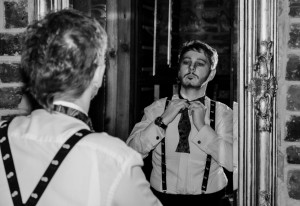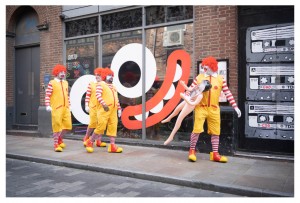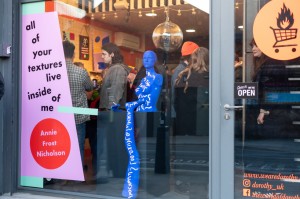Future City: The Futurist Library

This week’s Future City event includes a library of the future, stocked with books deemed essential to such a thing. What would you choose?
If you had to suggest books for a library of the future, what would they be? Would you be able to reel off stacks of titles or would you need more lengthy deliberation?
Like a special time capsule edition of desert island disks, this was the conundrum faced by artists, theorists, academics, writers, geographers and architects ahead of Future City; commissioned especially for the event, the Futurist Library throws up fascinating questions.
Initiated by Mathaf: Arab Museum of Modern Art, in partnership with the Liverpool Biennial (and in collaboration with Tate Liverpool, and Liverpool John Moores University) Future City is about considering what lies ahead, both in terms of of urban development and other, less tangible factors.
Of course, the glass half empty amongst us may argue it raises the pertinent question will there be any libraries at all in the future? Leaving to one side such nightmare visions all too close to reality, a list of the great and good – including curator, critic and art historian Hans Ulrich Obrist, social and cultural theorist Professor Imre Szeman and Tate Liverpool’s artistic director Francesco Manacorda – responded to the following question:
What should we read in order to think most imaginatively for the future?
Szeman took to the task with enthusiasm, selecting 14 titles ranging from Cyber Punk prophet William Gibson’s Virtual Light to a visionary of a different kind with, very aptly, Le Corbusier’s The City of Tomorrow.
Manacorda meanwhile confined himself to four, with artist Robert Smithson’s The Collected Writings (essays, interviews and articles) and Rainer Maria Rilke’s Letters to a Young Poet amongst them, while other titles leaping out from the list at us include Simone de Beauvoir’s The Second Sex and Dante’s Inferno. Formidable stuff.
On that basis therefore, it would be difficult to argue too strongly against such choices, but Aldous Huxley’s Brave New World making the cut while George Orwell’s 1984 is nowhere to be seen does seem strange, pointing to the subjective nature of any list. But it did get us to thinking about the question we posed right at the top:
If you had to suggest books for a library of the future, what would they be? Who could resist contributing to such a venture? Not us, that’s for sure. So here goes:
Unusually for us, there was little procrastination; our selections coming naturally one after the next. First to mind was Walter Tevis’ dystopia-exploring Mockingbird. Set in a world without art or literature (indeed, humans no longer understand what reading is) Tevis’ literary science fiction masterpiece paints a pretty bleak picture of where our species is in danger of heading.
Humanity’s attempts at harnessing robotics and Artificial Intelligence have led to a future in the tight grip of apathy, where immolations are everyday occurrences; yet it offers optimism and displays a touching degree of faith – faith in reading and therefore the inherent power in books. Ultimately it is a cautionary tale and a lesson future generations will do well to avoid having to learn.
Second on our list of recommendations could only be bibliophile Alberto Manguel’s loving collection of essays, The Library at Night. In the foreword, he writes “I’ve spent half a century collecting books. Immensely generous, my books make no demands on me but offer all kinds of illuminations”.
Justification enough as to why such a thing as a Futurist Library should exist, and later, in a chapter entitled The Library As Survival, Manguas recounts a librarian’s mad dash to save as many books as possible from the “looting and destruction” wrought on Jewish libraries by the Nazis.
He described it as “an act of rescuing memory per se,” continuing, “The universe, the ancient cabbalists believed, is not contingent on our reading it; only on the possibility of our reading it.”
Writing in the Observer, Peter Conrad called it “A crusading defense of the library as a mental sanctuary, a repository of memory, the only kind of home that has any emotional value for Manguel,” and The Library at Night, sentimental though it may be, serves as constant reminder of the crucial nature of such institutions, for now and ever.
We could reasonably end there, but we’d like one final choice. Not necessarily because it points to the continuing importance of books or deals with concerns for the future (though we believe the former is self-evident, and certainly the latter is part of the narrative), but because of the personal impact it had on our lives. This in the end is why we read.
Douglas Coupland’s Girlfriend in a Coma remains the only book which has drawn public tears from this reader, the only book we recall having heard Tom Paulin be gushingly positive about on Late Review (now The Review Show) – “I was absolutely knocked over by it” – and the only book on this list we’ll read time and again for the rest of our lives; it therefore tells us something about our past, present and future.
Books are both universal and personal and the Futurist Library is a chance, if one were needed, to reacquaint ourselves with why they are important and of what is contained within their pages.
Mike Pinnington
We will be live blogging Future City’s Friday Forum! For real-time updates check out the Biennial Blog 10am-5pm…
…And follow #FutureCity13 on Twitter





